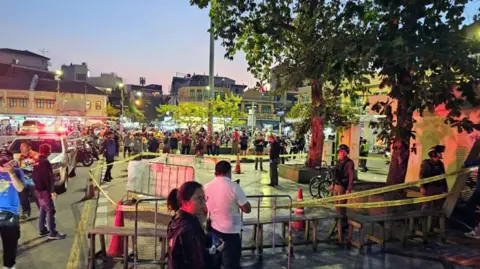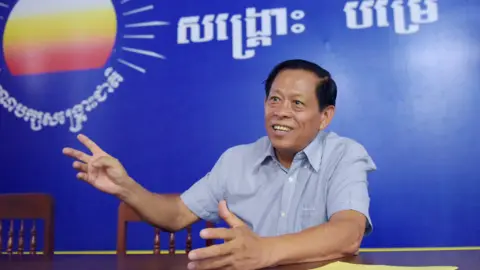 EPA
EPAIt had all the hallmarks of a cold-blooded, professional assassination.
Next to a well-known temple in Bangkok’s historic royal quarter a man is seen on a security camera video parking his motorbike, removing his helmet, so that his face was clearly visible, and walking calmly across the road.
A few minutes later shots are heard. Another man falls to the ground.
The assassin walks quickly back to his motorbike, appearing to throw something away as he does, and drives off.
The victim was Lim Kimya, a 73-year-old former parliamentarian from the main Cambodian opposition party, the CNRP, which was banned in 2017. He had been hit in the chest by two bullets, according to the Thai police. He had just arrived in Bangkok with his wife on a bus from Cambodia.
A police officer attempted to resuscitate him, but he was pronounced dead at the scene.
“He was courageous, with an independent mind,” Monovithya Kem, daughter of the CNRP leader Kem Sokha, told the BBC.
“No-one but the Cambodian state would have wanted to kill him.”
 AFP
AFPLim Kimya had dual Cambodian and French nationality, but chose to stay in Cambodia even after his party was outlawed. The CNRP – Cambodia National Rescue Party – was an amalgamation of two earlier opposition parties, and in 2013 came close to defeating the party of Hun Sen, the self-styled “strongman” who ruled Cambodia for nearly 40 years before handing over to his son Hun Manet in 2023.
After his close call in the 2013 election Hun Sen accused the CNRP of treason, shutting it down and subjecting its members to legal and other forms of harassment. In 2023 Kem Sokha, who had already spent six years under house arrest, was sentenced to 27 years in prison.
High-level political assassinations, though not unknown, are relatively rare in Cambodia; in 2016 a popular critic of Hun Sen, Kem Ley, was gunned down in Phnom Penh and in 2012 environmental activist Chut Wutty was also murdered.
From the security camera video the Thai police have already identified Lim Kimya’s killer as an ex-Thai navy officer, now working as a motorbike taxi driver. Finding him should not be difficult.
Whether the killing is fully investigated, though, is another matter.
In recent years dozens of activists fleeing repression in Cambodia, Vietnam, Laos and Thailand have been sent back after seeking sanctuary, or in some cases have been killed or disappeared. Human rights groups believe there is an unwritten agreement between the four neighbouring countries to allow each other’s security forces to pursue dissidents over the border.
Last November Thailand sent six Cambodian dissidents, together with a young child, back to Cambodia, where they were immediately jailed. All were recognised by the United Nations as refugees. Earlier in the year Thailand also sent a Vietnamese Montagnard activist back to Vietnam.
In the past Thai anti-monarchy activists have been abducted and disappeared in Laos, it is widely presumed by Thai security forces operating outside their own borders. In 2020 a young Thai activist who had fled to Cambodia, Wanchalerm Satsaksit, was abducted and disappeared, again it is assumed by Thai operatives.
The Cambodian authorities did little to investigate, and announced last year that they had closed the case. It is possible the same will now happen in the case of Lim Kimya.
“Thailand has presided over a de facto ‘swap arrangement’,” says Phil Robertson, director of the Asia Human Rights and Labour Advocates in Thailand.
“Dissidents and refugees are traded for political and economic favours with its neighbouring countries. The growing practice of transnational repression in the Mekong sub-region needs to be stopped in its tracks.”
When the US and UK-educated Hun Manet succeeded his father as Cambodia’s prime minister there was some speculation over whether he might rule with a lighter hand. But opposition figures are still being prosecuted and jailed, and what little space was left for political dissent has been almost completely closed.
From his semi-retirement the figure of Hun Sen still hovers over his son’s administration; he is now calling for a new law to brand anyone trying to replace him as a terrorist.
Thailand, which lobbied hard for, and won, a seat on the UN Human Rights Council this year, will now be under pressure to show that it can bring those behind such a brazen assassination on the streets of its capital to justice.
